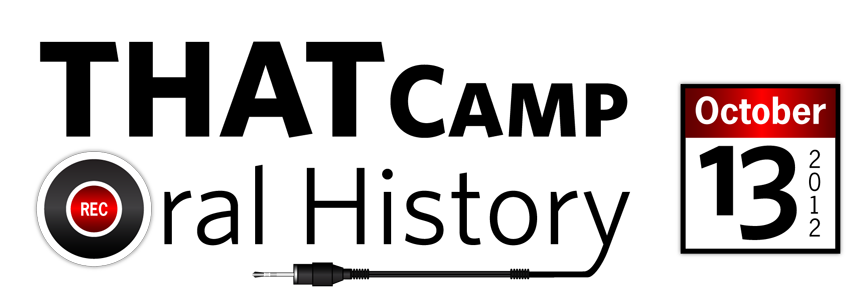NOTE: the following is a re-post of an email sent to attendees. It is posted here for quick reference by late registrants, organizers, etc…
I hope you are all looking forward to THATCamp Oral History, which is coming up soon!
Unlike most events you’ll attend at the Oral History Association Annual Meeting, THATCamp requires you to not only participate in each session, but to plan ahead and begin sharing and collaborating before we even meet.
One of the essential parts of a successful THATCamp is the event blog. Ours is at oha2012.thatcamp.org. Each of you have an account here and are expected to create a blog post describing what you would like to discuss when we meet on Saturday. Before or after you make your own post, you should also read others’, leave comments, introduce yourself, and begin thinking about which proposals sound the most interesting to you.
Not only will this allow us to begin our conversations early, and help us get to know one another, it is also the only method we have for creating a schedule on the day of the event. I repeat, without your blog post, the entire plan will break down. But no pressure or anything. 🙂
So here’s what each of you should do in the days leading up to THATCamp.
- Log-in to the site at: oha2012.thatcamp.org/wp-admin/
- Edit your profile at: oha2012.thatcamp.org/wp-admin/profile.php
- Read posts and leave comments at: oha2012.thatcamp.org/session-posts/
- Write a post describing your own session, discussion, or panel.
The first 2 are pretty easy, so don’t wait to get in there and edit your profile. You can probably check this off in under 5 minutes. Simply add your full name, a short bio, a link to your stuff (a website and/or twitter account), and a profile image. You can view your fellow campers’ profiles at: oha2012.thatcamp.org/campers/
Many people have a harder time writing their session proposal/post on the blog. The best advice I can give is to not worry too much about the details. THATCamp is a very informal event. Just use your post to present an idea, or even a nugget of an idea, that you would like to pursue at THATCamp. Jim Calder wrote a nice post on the blog, “Getting the most out of an unconference,” that may help guide your thinking on the event and your session proposal.
You can view current session proposals at oha2012.thatcamp.org/session-posts/
When we meet on Saturday morning, we will scribble session titles into a grid on a giant sheet of paper. You will sign your name next to sessions that interest you and we will use this to create the day’s schedule. It will look something like this: www.flickr.com… It will all be very analog and very hectic and maybe even a little bit exciting.
Similar proposals may be grouped together to create joint sessions. So if you are hesitant to present on your own, you can even note potential points of collaboration in your proposal. (As in, “my topic fits nicely with what Jane Doe has already proposed, so here is how I’d like to join in and add to that dialogue…”).
Again, don’t overthink it. This is a fun event, meant to spark conversations and connections. We might solve a few problems along the way, but don’t feel you need to arrive with all the answers. All that’s required is a positive attitude and active participation. That participation should begin today with your blog post, your feedback in the form of comments, and maybe even with making some new friends on Twitter and tweeting with the #THATCamp hashtag (if you’re into that sort of thing).
Please get in touch if you need a hand using the website or have any other questions. Otherwise, I’m looking forward to reading your posts and meeting you all at the event!
